Crossword
 Easy sudoku
Easy sudoku

Hard sudoku

A few weeks ago, I had the privilege of speaking with Fiji’s president, His Excellency Jioji Konrote. We met at Suvavou Seventh-day Adventist Church in Suva—he is a committed, practising Adventist. I asked him up front if Fiji is still a “Christian nation”—I was thinking sentimentally, of course, of the Fiji of my childhood. Back then, in the 1950s, the absolutes seemed secure—black-and-white morality in an unquestioned Christian context that defined everything. But, without pausing, Konrote flatly admitted, “I don’t know.” I admired his honesty as he proceeded to give an account of the ethnic and religious diversity of present-day Fiji. The nation’s multicultural character has made it difficult to use one simple descriptor, such as “Christian”.
Several decades back, it seemed easy enough to me, as a child: we lived as Christians in a Christian household in a Christian community. We were Adventists and others in our community included Anglicans, Methodists and Catholics in a British Pacific colony that would evolve over time into the nation of Fiji. Clear rules existed around most activities and lapses were tolerated so long as confession and repentance were resorted to as weekly, if not daily, rituals. No-one questioned the “Christian” adjective.
But a clear, single identity of any kind in these postmodern times is a problem. The president’s reply—“I don’t know”—is a symptom of the disappearance of certainty that now accompanies us even into the most remote Pacific communities. What is a “Christian” nation, or village, or custom, or principle anyway? For example, a Christian in my early years had clear beliefs about what marriage entailed. Today, marriage in some settings, even “Christian marriage”, includes the same-sex variety—affectionate intimacy, not gender difference, is considered to be the defining variable. When we change the defining variable of anything, what was certain yesterday becomes an open question today.
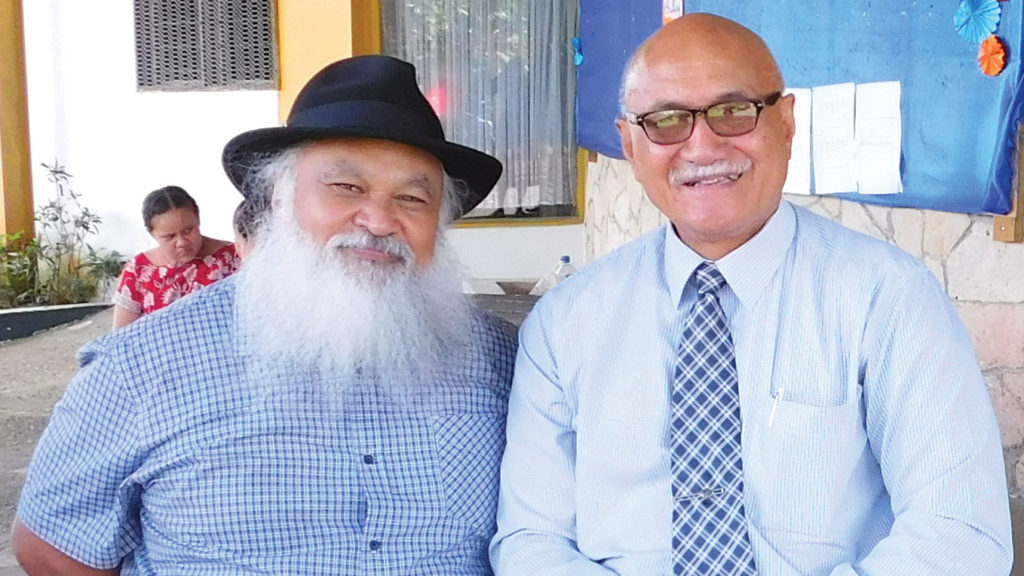
In 1963, facing the prospect of decolonisation, the Fijian chiefly leader, Ratu Kamisese Mara, convened a special Great Council of Chiefs meeting on the (now tourist) island of Wakaya. The meeting aimed to settle the status of indigenous Fijians in their own islands going forward toward independence from the United Kingdom. Ratu Mara and others involved recall that the meeting produced a communique for London and the Crown that became known as “The Wakaya Letter”. Among the aspirations underscoring the indigenous perspective, the letter outlined that “Fiji should be a Christian state” and that “no constitutional or administrative changes should take place that would deviate from that intention”.
Twenty-first century Fiji celebrates its 50th anniversary of independence on October 10, 2020 and, since 2013, has been constitutionally defined, not as a Christian state, but a secular state. How did it come to that? Well, for a start, no-one has ever satisfactorily defined exactly what a “Christian state” is.
In 1987–88, after conducting Fiji’s first (May) and second (September) coups, then-Major-general Sitiveni Rabuka, a lay-preaching Methodist soldier, allowed the introduction of “Sunday bans” to help hallow Christian Sunday observance through the nation. This experiment with enforced religious practice soon soured the population’s taste for patriotic piety and for any notion of a Christian state, as that was what the Sunday bans were seen to represent.
In the decades since those first coups, the Christian state dreamed of by the 1963 chiefs on Wakaya has been bandied about in media-led discussions and constitutional review submissions, but all that remains of it is a cherished hope in the hearts of indigenous nationalists. Most of Fiji is resigned to the fact that whatever a “secular state” amounts to, it will do for now. Despite lobbying for Fiji to be proclaimed a Christian state in constitutional review submissions in 1995 and 2012, these suggestions have been batted away as impractical and even prejudicial to the national interest.
It is fair to say that public lobbying for an officially Christian state has been displaced by a private longing that Fiji can be minimally a “Christian nation” in some sense of the word—that Christians should be more Christian in their ways; that the government should be more Christian and less corrupt; that the symbols of the nation should reflect Christian values and many other vaguely defined aspirations. And that, somehow, God will be glorified and the people as a nation will be better than they are now.
Just what being “better” would look like is also contested. Throughout the Pacific, Christianity is increasingly preached as a passport to prosperity. New Methodists, as they call themselves in Fiji, often link their brand of the Christian gospel with the ambition of increased personal wealth—indeed for some it is a mandatory sign of divine blessing. Poverty—regardless of its sociological, cultural and political root causes—is a sign of heaven’s curse. Social justice concerns and human rights issues are negatively viewed as dirty secular politics—Christians and churches who engage with human suffering in these ways are accused of transgressing their vocation.
But the realities of poverty, unemployment, corruption, crime, violence, ethnic tension and land rights struggles are felt daily by Pacific island peoples at the margins of a globalised world that is exacerbating the distinctions between rich and poor, elites and left-outs, haves and have-nots, and those above the water-line and those whose lifestyles will soon be drowning in their front yards.
Political and personal templates that seek to Christianise anything—any institution, people, ethos, culture, economy, nation or state; believing that just attaching the “Christian” tag will magically improve a population’s lot—are false christs. Jesus alone Christianises us and, through us, His creation. It is a humbling transformation that comes one by one, person by person, not by mass assimilation or constitutional law.
As we help spread the good news in this regard, we must confess that our technologies are not the Holy Spirit; our techniques are not sacred. In uprooting secular and corrupt traditions, we must, as Christians, be wary of imposing one-size-fits-all politics, policies or programs that are blind and deaf to multicultural variation and advancing light. The kingdom of God, Jesus said, is within us (Luke 17:21). Only then can it shine out of us. If a Christian nation is to exist, it has to be found in our hearts before it can be realised in our politics. We must be Christian individuals where we are. And only then, as salt or yeast works its way through the whole lump of dough, can we become Christian in any collective sense.
Fiji-born Robert Wolfgramm is a retired Australian academic with a long interest and occasional engagement in Pacific politics. His current concern is West Papua. A list of further reading on the topics raised here is available at the online version of this article <pacificsigns.info>.
Jesus said the Sabbath is for our benefit
“The Sabbath day was made for man. Man was not made for the Sabbath day” (Mark 2:27). In saying this, Jesus calls us to remember the purpose of Sabbath—rest and freedom; connection with God. If we create so many rules and expectations that Sabbath is a day of stress and worry, are we really keeping the seventh day according to God’s plan, or are we in fact breaking it?
Jesus claimed the Sabbath as His own
“The Son of Man is Lord of the Sabbath day” (Matthew 12:8). This is one of Jesus’ clearest statements that He, the Son of Man, is in fact God. If Jesus is Lord of the Sabbath day, then He must also be the creator of the Sabbath and, therefore, the Creator of heaven and earth. Our Creator-God restates in this verse His connection with the Sabbath-rest He has made. Sabbath is not just for ancient times, or just for the Jews, but God reminds us here that Sabbath is part of His creation for all humanity and for all time.
Jesus worshipped on the Sabbath
“Jesus went to Nazareth, where he had been brought up. On the Sabbath day he went into the synagogue as he usually did” (Luke 4:16). There are multiple mentions in the four Gospels of Jesus participating in worship with His Jewish community on the seventh-day Sabbath. Some Bible translations of Luke 4:16 say this was His “custom”. After His death and resurrection, the early Christians continued this custom—the apostle Paul’s Sabbath worship is specifically mentioned in Acts 17:2.
Jesus healed on the Sabbath
“This woman is a member of Abraham’s family line. But Satan has kept her disabled for 18 long years. Shouldn’t she be set free on the Sabbath day from what was keeping her disabled?” (Luke 13:16). The healing of this bent-over woman is just one example of Jesus’ many Sabbath acts of mercy (see also Matthew 12:9–14, Luke 4:31–35, Luke 14:1–6, John 5:1–14). His actions challenge all of us who call ourselves Christians—does our focus on church activity and our personal “holiness” sometimes prevent us from seeing the needs of people right in front of us?
Jesus rested on the Sabbath
“The Sabbath day ended. . . . Jesus rose from the dead early on the first day of the week” (Mark 16:1,9). In Mark 15, we are told that Jesus died on the cross on the Preparation Day; what we usually call Friday. In Mark 16 it’s clear that Jesus lay in the tomb for the entire 24 hours of Sabbath, from sunset to sunset, and rose again on the first day, which we usually call Sunday. As in Genesis, where God rested after all His work, Jesus rested in the tomb on the seventh day.
Q: Dr Chester, when missionary doctors first visited remote villages in the South Pacific, what health problems did they find?
a: The health problems our early missionary doctors found were mostly infectious or communicable diseases; respiratory diseases such as pneumonia in both children and adults. By this time infectious diseases such as tuberculosis and typhoid fever had been introduced and became major problems. Diarrheal diseases and skin diseases were rampant due to ignorance on the principles of both hand-washing and personal hygiene.
Q: Now that modern medicine has arrived in much of the Pacific, are we seeing less problems with infectious diseases?
a: Yes. Nowadays infectious diseases are not as common. We are witnessing a significant reduction in infectious or communicable diseases such as leprosy, malaria and tuberculosis.
Q: But in our history, wasn’t it also the case that while Captain Cook’s sailors, for example, suffered from serious diseases like scurvy, syphilis and smallpox, the Pacific peoples they encountered were healthier in many ways?
a:The people of the Pacific had some advantages because they lived mainly on plant foods, mostly high-fibre carbohydrates such as wild taro, yams and later sweet potato and cassava. Leafy vegetables and fruits constituted an important part of their diet—pawpaw, coconut and other locally grown fruits. Our Pacific people back in those early days lived a very active lifestyle. They worked in their garden most days. Walking was their main mode of transport. They never stopped walking, chopping, paddling, digging, fishing—and living.
Q: Looking across the Pacific today, it seems there’s a wide variation in health outcomes. Places like Nauru, Cook Islands and Fiji are among the world’s most obese nations, for example, but in PNG or Solomon Islands it seems there are very few obese people. What makes the difference?
a: Genetics may play a part in body size, but Melanesians appear to be somewhat more active, particularly those living in the rural areas. Poverty may play a part in this scenario. But, having said that, obesity is becoming a major issue in the Melanesian population. In Solomon Islands, for example, 30 per cent of the female population are overweight or obese and similar trends are observed in Vanuatu and Fiji.
While the typical diet in rural Melanesia is still somewhat plant-based, the introduction of highly processed foods such as white rice, noodles, soda drinks, corned beef and sausages is making major inroads like we’ve never seen before. The result is some major health issues. It would be true to say that the prevalence rates of diabetes, for example, may not be too different in rural Melanesia compared with urban Melanesia. The majority of diabetic patients in these countries come from rural areas. Non-communicable diseases now account for approximately 70–75 per cent of the disease burden in and across Melanesia, indicating that obesity is not the only risk factor for lifestyle disease. Other risk factors such as an unhealthy diet, smoking and alcohol use should be taken into account.
Q: Most people in the Pacific respect the Holy Bible. Do our Scriptures give us any guidelines for better health?
a: Approximately 90 per cent of the Pacific population are Christians so the sad reality is that the majority of people who die from lifestyle disease here are Christians. Here is a concern—overeating, or “gluttony” as the Bible phrases it, has long been a major issue in the Pacific. While most religions encourage us to avoid damaging behaviours such as drinking and smoking, overeating is usually not considered a great sin.
There are wonderful counsels in God’s Word on health, diet and lifestyle that, if adopted, can help to prevent many people succumbing to lifestyle disease. Some examples:
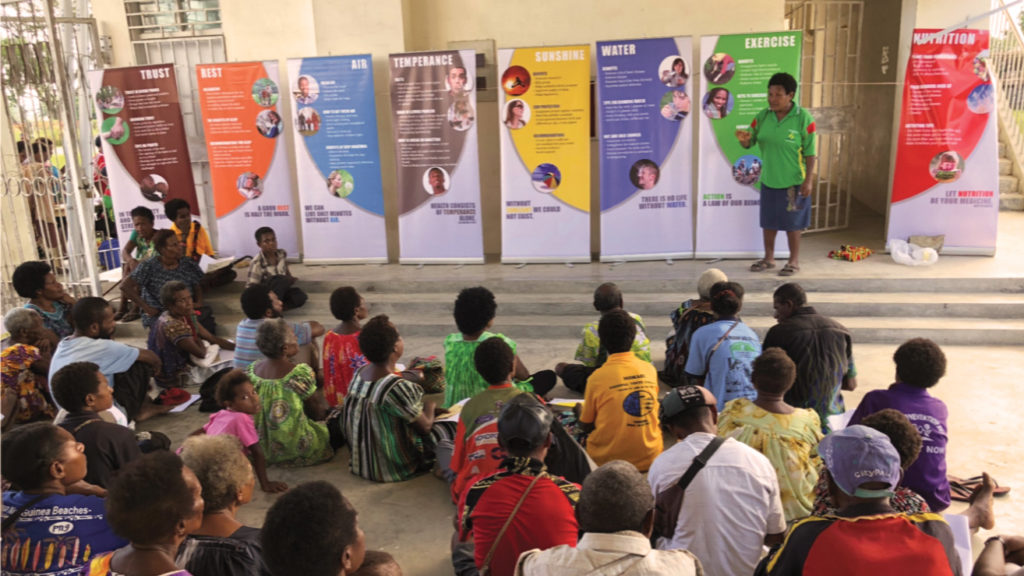
Q: How can church communities help their members embrace these biblical health principles?
a: Every local church should be encouraged to be a centre of health influence within its community, and every member a health promoter. This means that we are not only preaching health and giving advice to people on health principles, but that we ourselves are living those very principles.
We must include health in the life of our churches. One way this can be done is comprehensively integrating health into the various departments within the local church. For example:
Our churches need to invest time and resources into organising health programs to help their members as well as the wider community. Programs provided by various Seventh-day Adventist churches, for example, are the Addiction Recovery program, stop-smoking programs and the Complete Health Improvement Program (CHIP).
Q: What about governments? Surely they should have a role in building health awareness?
a: The governments of the Pacific are now seriously looking at ways to combat lifestyle disease through policies and tax. Most countries have set high tax rates on cigarettes and alcohol. Some countries like Solomon Islands are seriously considering increasing tax on white rice, noodles, soda drinks and other similar commodities.
Q: You’re a doctor, so please, give us a prescription to improve our health.
a: My prescription includes:
Dr Chester Kuma has worked as a surgeon and health administrator in his home country of Solomon Islands. Now based in Sydney, he leads the Seventh-day Adventist Church’s health ministry for the South Pacific region.
Solomon Islands, a group of 900-plus oceanic islands and atolls, is a country ravaged by unsustainable logging. If you happen to fly over any large island within the archipelago, or simply view close-up aerial images of these islands on Google Earth, you cannot avoid the sight of recent and current logging activities on the landscape below. But appearances can be deceiving—not all the damage is visible from above. While most of the logged forests across the islands seem to have regenerated, forming a continuous mosaic of green cover carpeting the landscape from coast to inland, under these canopies lie thousands of lifeless stumps.
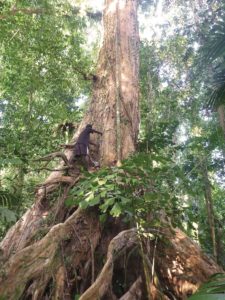
Unsustainable logging practices have generally hampered the recovery of logged forests in Solomon Islands. A decade of scientific research on post-logging recovery on Kolombangara Island in the Western Solomons has shown that plant diversity and architectural structure of logged forests have not recovered to their pre-logged state even after 50 years of natural regeneration. The study shows that unsustainable logging practices were the main cause of poor recovery patterns seen on the island. Other scientific studies have also confirmed that unsustainable logging has negatively impacted ecological connectivity between the land and sea. For example, earth-moving activities associated with logging—road-clearing and skidding—directly dislodge soil that is washed into rivers and streams that then transport loads of sediment into the sea. These sediments can cause death to soft-bodied animals within coral communities. These animals are mostly filter-feeders, meaning that they collect whatever food particles are suspended within the water. Excessive sediments in the ocean can be lethal to these delicate creatures. Dislodged sediments flowing through fresh waterways also reduce water quality to levels unsafe for human consumption and use. This is a serious problem in the Solomons, where most rural communities still depend heavily on rivers and streams for clean drinking water.
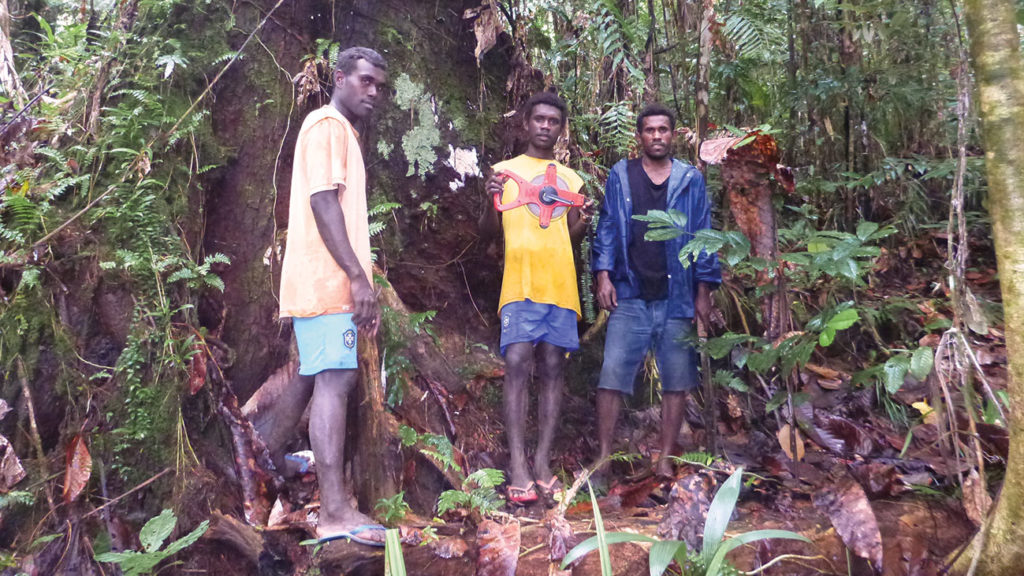
Over the years logging has become the most important driver of forest degradation in Solomon Islands. Unsustainable logging has thrived mainly due to the economic interests at both local and national levels. Over the past 50 years or so, logging has been a source of easily earned income for local landowners through royalty payments. Income from round log exports contributes to about 60–70 per cent of the country’s total export revenue, which just shows how important the logging industry is to the country’s fragile economy. Economically driven corruption within the industry, limited funding for forest monitoring, contention over royalty benefits within local communities and the lack of information for policy development to ensure sustainable logging have all provided the ideal environment for unsustainable logging to flourish over the years. As a result, most (if not all) accessible lowland forests in Solomon Islands will be logged within a decade. If this doesn’t sound bad enough, environmental NGO Global Witness, in its recent research on logging in the Solomon Islands, predicted that heavily logged forests might not recover at all, thereby resulting in fragmented remnant forest patches entwined with grassland. Our landscape will be permanently altered and who knows what further flow-on effects this will have.
A Biblical perspective
And yet, as is the case in most Pacific nations, the people of Solomon Islands overwhelmingly identify themselves as Christians. Does this not mean that we are stewards and custodians of God’s creation; all earthly resources entrusted to us in this life? In the churches, much emphasis has been placed on financial stewardship; we tend to do well in returning our tithes and offerings to God. We also attempt to practise good stewardship when it comes to managing our time and opportunities, abilities and non-monetary possessions. However, many times we fail miserably to realise that the blessings of this earth and its resources go far beyond the dimensions of our pockets and the balance of our bank accounts. Our stewardship responsibility also includes the natural environment on which we depend. Our earthly possessions include the natural forest ecosystems and the free services they provide to humanity—clean air, clear water, food, shelter and much more. Therefore, we have the responsibility to protect and sustainably manage our forests for future generations—that’s what we are required to do as God’s stewards.
The Bible tells us that, during the creation of the world, God planted a garden: “He put in the garden the man he had formed. The Lord God made every kind of tree grow out of the ground. The trees were pleasing to look at. Their fruit was good to eat” (Genesis 2:8,9). We see three important principles here. First, God created biodiversity—there was a wide variety of trees in the garden (“every kind”), not a plantation of one species. Second, the natural world and the trees God created were beautiful—“pleasing to look at”. To notice and preserve the beauty of the created world are acts of worship. And, third, God gave the garden as a sustainable resource—it was designed to provide for the needs of humans and other living creatures. It was not the kind of resource that would be smashed down, stripped bare and then abandoned, but an ongoing, carefully managed resource that was a healthy, productive and permanent place for people to live.
Later in biblical history, as the children of Israel came to Canaan, each tribe and family was given their land as a permanent possession. Again, they had to farm and care for the land sustainably, because their family would continue to live there for generations (see Exodus 23:10,11—this practice encourages soil health). But there was still “wilderness”—land left unfarmed and in its natural state. And it was in the wilderness that many of the prophets and others had their closest encounters with God—Abraham on Mount Moriah, Hagar at the spring, Moses at the burning bush, Elijah and the Still, Small Voice. To this day, many Christian believers find that they feel especially close to God in a natural environment untouched by the hand of man.
The final book of the Bible, Revelation, warns of a coming crisis as this world’s history nears its end. Revelation also warns of a judgement on evildoers—those who have resisted and rejected the gospel of God’s love, forgiveness and restoration and instead worshipped the satanic beasts. Judgement is pronounced against one particular group of evildoers in Revelation 11:18: “It is time to destroy those who destroy the earth.” We are faced today with “those who destroy the earth” through pollution, climate change, even the threat of nuclear weapons. And yes, through deforestation. The Bible warns of the consequences if this group does not repent.
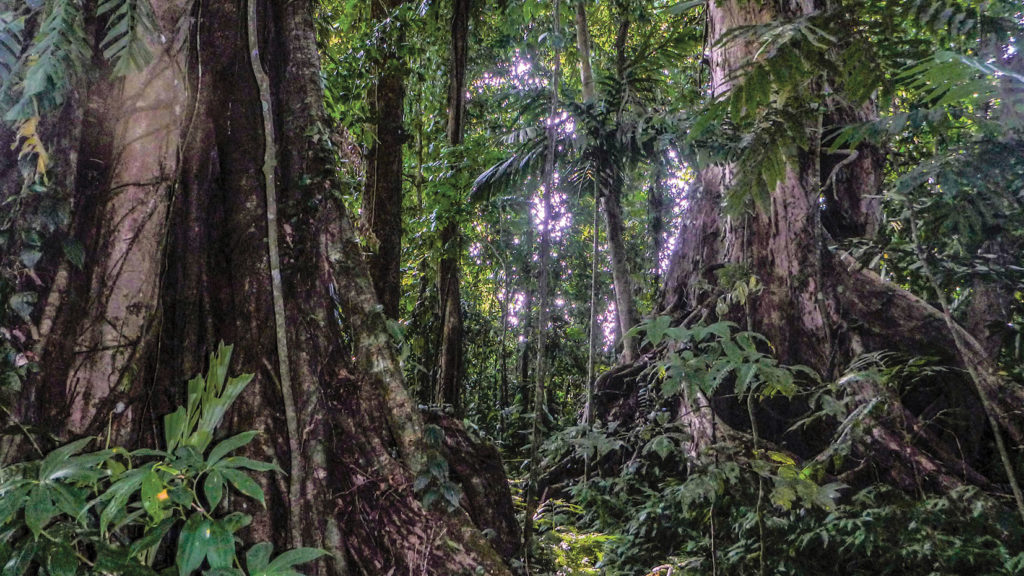
Logging sustainably
In Melanesia, the philosophy and practice of “sustainable logging” is considered far-fetched, sadly even among Bible-believing Christians. It is possible, however, to ensure that some measures of sustainability are taken when conducting or allowing a logging operation on your land. Here are a few tips on good forest stewardship:
1. First and foremost, consider alternative land-use income-generating activities that are less damaging to forest ecosystems, but can still produce economic benefits as compared to logging. If the decision to allow logging is made, advocate for “reduced-impact selective logging” as a less-damaging alternative—only certain tree species of a certain size can be taken via cautiously planned and controlled harvesting strategies.
2. Before logging begins, communities can first engage in a mapping exercise where all known resources important to the community are identified. This should include environmental resources, such as trees growing near rivers and streams that prevent soil erosion, as well as “buffer zones” around cultural sites and places valued for their natural beauty, such as hilltops, rock formations or waterfalls. The community can then mark areas of high conservation value as “no logging”.
3. When establishing communications with an interested logging company, make sure all decisions made under the previous point are clearly stated in the logging agreement. This will help with any later disputes.
4. While logging is happening on your land, ensure that the company strictly adheres to the agreement. If the company does not comply with the agreement, you have the right to report the situation to the government forestry officer overlooking your area and also to advise the company to stop its operation until a proper inspection is carried out.
5. Develop a plan for restoration of the land after logging. How can the logging company and the community work together to give the forest its best chance of regeneration? What local plant species can be nurtured and transplanted to cover logging-induced gaps?
6. Finally, we preach in our churches about giving one-tenth of our blessings to the Lord as tithe; why not commit 10 per cent of your best forested land to the Lord? Biodiversity and conservation researchers agree that 10 per cent of well-represented areas of a forest are indicative of the total biodiversity throughout the landscape.
I pray that, as we consider these issues, we will hear God’s call to stewardship in every area of our lives. He has given good gifts to His children, including the beauty and natural resources we find in our forests, rivers, mountains and oceans. He asks us now to take good care of what He has given.
Eric Katovai is a tropical ecologist from the Western and Choiseul provinces in the Solomons and is currently a senior lecturer in environmental science at the University of the South Pacific in Suva, Fiji. He previously studied and worked at universities in Australia, Fiji and Papua New Guinea.
One thing is certain. Postmodern people are busy. As Pacific nations strive to modernise, we are beginning to see negative changes along with the positive. Particularly in our towns and cities, workers in government or business offices are under pressure to perform, to account for their budget and time, and to constantly improve their efficiency and outcomes. Too many employees are pushed to accept work that they must complete after office hours—even on weekends. Every tick of the clock says “work, work, work”. Parents sometimes have very little time to spend with their children, and long months or even years will go by when city workers never see their home village, their ageing parents or other relatives. What are the results of this high-pressure lifestyle? Health problems from inadequate sleep, a diet of rushed junk food and a lack of physical exercise. Neglected marriages, children without guidance finding bad friends, alcohol or other drugs. The push for excellence in the workplace can become the cause of broken families, stress and depression, overweight, diabetes, heart disease and early death.
The Bible says . . .
In this context the Bible truth about Sabbath rest becomes more important and the practice of Sabbath-keeping is more needed. Sabbath doesn’t need us; we need the Sabbath!
Sabbath is first mentioned in the book of Genesis. The Scripture says God ended His work and rested on the seventh day (Genesis 2:1–3). In fact, it was Adam and Eve’s first complete day. It was the crowning touch on the work of creation. It was not a day when Adam and Eve were tired and needed to have rest. It was a whole new day, a time to look back and thank God for all that He had created for them.
Sabbath was a delight. It was a day of celebration. It is said that people are stressed when they don’t complete what they started. Not so for God. He completed what He started in creation and so Sabbath was a day of delight (see Isaiah 58:12,13).
The focus of Sabbath is God. Adam and Eve recognised God as their Creator and were grateful for the things He had made for them. The first Sabbath day provided this opportunity for them to praise, thank and worship God.
Jesus performed seven healing miracles on the Sabbath day. One of these miracles was when He healed the lame man by the pool of Bethesda (read John 5:1–18). This healing attracted criticism from the religious leaders. But to the person healed that Sabbath day became very special. On this day all his worries and burdens were lifted and gone. He was set free. Sabbath truly became a day of freedom for him—a day of rest.
Most of us know the Ten Commandments, including the fourth, which tells us to “Remember to keep the Sabbath day holy” (Exodus 20:8). But there are two different versions of the Ten Commandments and each gives a different reason for the Sabbath. The most well-known version in Exodus 20 connects Sabbath to creation, as I’ve done above. But the second version of the Ten Commandments, in Deuteronomy 5, provides a different reason for Sabbath to the children of Israel: “Remember that you were slaves in Egypt. The Lord your God reached out his mighty hand and powerful arm and brought you out of there. So the Lord your God has commanded you to keep the Sabbath day holy” (verse 15). The Sabbath was a reminder of rescue from slavery. To be able to observe it was the privilege of a free people! As such it was a day of delight and celebration. Maybe if we viewed the Sabbath day that way, we would see it as a time of celebration, too.
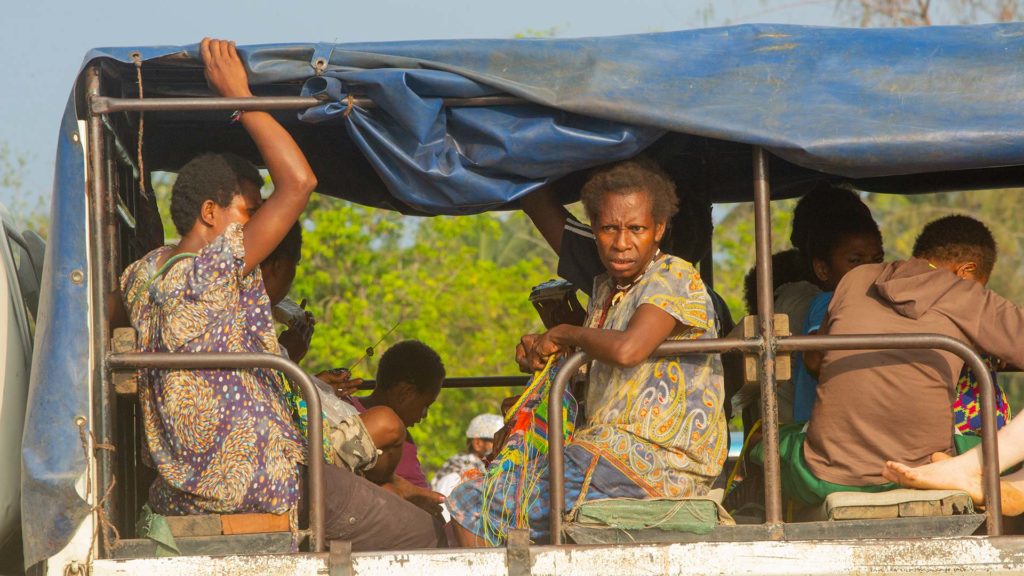
Healing the heart
My friend Ray Paul is very active in his local Adventist church about 20 kilometres outside of Port Moresby. Every Sabbath he drives his family to the village church, spends the whole day in worship and returns back to the city late after sunset. What seems admirable to me is that Ray is the chief customs officer for Papua New Guinea. As such he has a busy schedule almost all year round. But what I couldn’t quite understand is that he still seems to have the vitality and energy to be involved in his local church.
Some time ago I talked with Ray as he drove me to his local church. I posed the question, “Ray, are you not tired when it comes to Sabbath?”
Ray said no. He told me that Sabbath is his best day. He said all through the week he wears the hat of director: “It’s very stressful during the week playing this role.” But on Sabbath he leaves his office work behind, he comes to worship and becomes just like anyone else in the church. For him Sabbath is truly rejuvenating. Healing. Renewing. There’s no hierarchy; everyone comes and worships God as His children.
Release your load
It is helpful for us as busy modern people to leave all the stress of work behind as we are about to enter the sacred hours of the Sabbath. Do not be like the old lady from the village who went for the first time to town. She was picked up by a wantok in a pick-up truck. She climbed up into the truck with the other passengers, but while travelling she still kept her heavy bilum bag on her back! Another passenger had to remind her that she could put down her load and let the truck carry it!
Many times we can be like this overburdened woman. We still carry our load into Sabbath hours when we should have left it behind as we enter His Sabbath. God wants us to enjoy the Sabbath rest He intends for us.
May the Sabbath day, God’s holy day, be a day of celebration. You can carry your mat, leap for joy beside the pool and praise God for your healing and freedom on this special day of true rest.
Born and raised in Solomon Islands, Leeroy Elisha is a senior lecturer in Education at Pacific Adventist University, Port Moresby, where he lives with his lecturer wife, Judy Tigulu.
Papua New Guinea is culturally diverse and rich linguistically with some 850-plus local languages as well as its three official languages, Hiri Motu, Tok Pisin and English. English is the language of instruction in schools from Grade 3 to tertiary level, but for many PNG students, it is a third or fourth language and problems can be expected in comprehending, speaking and writing.
The Bible Summary Project is the reading and summarising of a story or a chapter of the Bible every day. It was initially introduced for PNG secondary students, but, since 2016, tertiary students and upper primary students in PNG Adventist schools, and some other schools, have also adopted the program. The purpose of the Bible Summary Project is two-fold: first, to help improve students’ written English and, second, to develop a student’s personal relationship with God, the Master Teacher.

Students are encouraged to write at least a two-paragraph summary each day. Insights gained or lessons drawn from the story/chapter with personal applications can either be incorporated into their summaries or listed separately. Many students realise through this exercise that they have discovered a message that can be shared with someone else—maybe a schoolmate, friend or family member. Consequently, the Bible Summary Project has also turned out to become an evangelism tool for many faithful students, apart from it helping to improve their written English and leading to better grades in all subjects—not to mention improved behaviour and attitude!
There’s no reason why any adult with at least a primary-level reading ability cannot make this simple exercise a part of their daily practice. Or if your children attend a school that does not provide the Bible Summary Project, you can do something similar at home—the benefits will still be there. The Bible summary process will improve both reading and writing ability, but, more importantly, regular time spent with God’s Word will transform your heart and character into His likeness.
The process
The five steps that students follow to produce their summaries are:
Here’s an example of a summary of Matthew 24 with particular emphasis on steps 3 and 4 above.
(Note: As a starter, a student might actually write out the what/where/how questions with short answers to each question, but for an experienced reader all these are processed in the mind only. In Step 4 the student writes out the responses (from Step 3) in complete sentences to form his/her paragraph(s), making sure that the ideas are logically presented. After a few attempts, Step 3 becomes easy and no writing is required except in Step 4, the Bible summary itself.)

Asking what/where/how/etc questions
Q: What were the disciples fascinated with?
a: The temple buildings.
Q: Where is Jesus and what is He doing when His disciples come to Him with their questions?
a: On the Mount of Olives; sitting.
Q: Are there other people with them?
a: No, the disciples went to Him privately.
Q: What questions did they come to ask Jesus?
a: “When will this happen? And what will be the sign of your coming? What will be the sign of the end?”
Q: What signs did Jesus mention would herald His coming and what are some of His comments relating to them?
a: See list below (sometimes it’s easier to make some notes in point form like this):
False messiahs—“Many will come in my name. . . . They will do great signs and miracles. They will try to fool God’s chosen people if possible” (verses 5, 24).

Summary of Matthew 24
Now the challenge is to re-write this story logically and briefly, in your own words.
Jesus had left the Temple when asked by His disciples what He thought of the buildings, which they were fascinated with. He made it clear that the buildings would be completely destroyed.
Later, as Jesus was sitting on the Mount of Olives, His disciples came to Him privately, obviously troubled with the destruction He had predicted. They asked when it was going to take place and what signs would indicate His return. He cautioned them to be alert at all times so as not to be easily deceived by false Christs and false prophets. He listed the signs of His coming and the end of the age—these include wars, natural disasters, persecution and death. But, He said, when the “good news of the kingdom will be preached in the whole world. . . . Then the end will come” (verse 14). Be ready. Jesus is coming.
Insights gained
2. Whatever troubles me can never trouble Jesus; He has answers for all my perplexing questions and needs.
3. No matter the time of day, come to Jesus. He always has time for me.
4. Jesus loves me and wants me saved in His Kingdom. He cares enough about me to provide warnings and signs of His return.
5. Prayer and share
I will share these messages with [name of friend, work colleague, etc] today so that he/she too can be ready to meet Jesus.
It is only those who make the study of God’s Word a daily habit who will find strength to go through the times of trouble predicted by Jesus Himself. A checklist of these signs indicate we are on the threshold of earth’s final moments already today. Can we not safely say that the end might come sooner than we expect?
Remember Jesus is not willing that any should perish (John 3:16). He loves you and me and is coming back to take us home. Am I—are you—ready to meet Him?
Serah Keliwin is associate education director at the Papua New Guinea Union Mission of the Seventh-day Adventist Church, and the founder of the Bible Summary Project.
When a person handles money, their brain produces the same chemical that is produced when a person takes drugs. People fight for money, gamble to get it, and lie, cheat, and steal to hold on to it.” These words from John Matthews, author of Stewardship: The Motives of the Heart, define the culture of our time when it comes to money. For too many of us, money has become a destructive addiction. Therefore, teaching children how to manage their money while they are young is absolutely important. As the Bible says in Proverbs 22:6, “Start children off on the right path. And even when they are old, they will not turn away from it.” In this article, we will look at four important principles that are at the foundation of effective and godly money management.
1. Think straight
Developing the right attitude towards money is the first lesson to be taught. Money is not evil. It is a blessing from God. “He gives you the ability to produce wealth” (Deuteronomy 8:18). He supplies strength, talents, abilities, time and natural resources (land, ocean, rivers, minerals, plants and animals) to be wealthy. Teach and show your children the way to make an honest income based on godly principles. The wise man Solomon tells us to learn these lessons from watching a busy ant at work (see Proverbs 6:6–11).
Is God glorified in the way we earn our living? There are many ways of making money that dishonour God. Not just criminal enterprises like selling marijuana or armed robbery, but also making and selling products that damage people’s health or working in a way that spoils and pollutes the beautiful world God created for us. Making an honest and principle-based income is crucially important.
Our attitude to our work is one way to glorify God. Will the people you work with want to know your God better if they see you complain every day? If you are not careful in completing each task with excellence? If you take every opportunity to have a rest or a chat instead of focusing on your job? Listen to the words of the apostle Paul: “Work at everything you do with all your heart. Work as if you were working for the Lord, not for human masters. Work because you know that you will finally receive as a reward what the Lord wants you to have” (Colossians 3:23,24). Yes, that is the kind of attitude to work that will make other people wonder what makes you different. And that is the attitude our children need to learn also.
At the same time, is God glorified in how we spend our earnings? The spending should be based on principles and needs—what we know is truly important. Our family’s and community’s health, safety and wellbeing are important. But spending outside of these guidelines is often purely driven by impulse, greed or the desire to impress our neighbours and friends by showing off our material possessions. Therefore, making income and spending in ways that align with God’s Word brings glory to God.

2. Make a plan
Budgeting is crucial, as it helps keep track of all income and expenses. Keeping an accurate record of all income (gifts, wages, handouts) is very important, as it will guide you to understand where the sources of your financial wealth lie. At the same time, keeping an accurate record of all expenses is important too, as it will help you understand what consumes your money—cultural obligation, cosmetics, food, etc.
As Christians our budget should glorify God. “Budget” just means to make a plan for how you will use your money, and then to stay close to the plan. Christian financial advisor Alex Cook proposes a simple strategy to teach children how to budget: he calls it the “Three Jar Strategy”. To do this, you will need three jars or other containers in a safe place. Money should not go in or out without the child’s knowledge.
Jar One is labelled “Giving to God”—this is the jar to teach the child to put God first and foremost in life. Using the biblical principle of tithing (Numbers 18:21, Malachi 3:8–12), 10 per cent of the child’s income should go into Jar One as well as any extra money the child feels moved to give to those who need it. This money should be given to support God’s work and God’s church. Giving was designed for the giver’s benefit, not the benefit of the recipient. This will help the child to cultivate a generous spirit and become a valuable part of the community who cares about others’ needs.
Jar Two is for “Long-term Savings”. It teaches the value of saving and delayed spending. To achieve long-term goals and a debt-free life, there is no other way than to invest towards it. If the child has a particular future purchase in mind—a bicycle, some art supplies or a phone, for example—this goal will keep them motivated and the eventual purchase will reward their effort and patience.
Jar Three is labelled “Spending”. Naturally, the spending must be within the amount in the jar. And spending based on principles and genuine needs has more value than spending recklessly.
The Three Jars method is suitable for adults as well, although you may prefer to have three bank accounts or three places in a notebook where you keep track of your money. But your children are more likely to learn the value of the Three Jars if they see their father and mother also budgeting.

3. Don’t be a slave
Failure to save and spending above our income leads to borrowing. Studies have confirmed that this society is ridden with debt. There is an expression in Papua New Guinea: “maket mama em bos blong save card”, or, in English, “the market women are in charge of the bank cards”. This refers to how regular income earners who keep spending beyond their means must borrow from market retailers who have cash at hand. To make sure the debt is paid, these tough-dealing “market mamas” demand their debtors’ bank cards until the borrowed money has been recouped. The ancient wisdom of the wise man is proved absolutely correct: “Borrowers are slaves to lenders” (Proverbs 22:7).
4. Be content
This generation is struggling to find one simple thing: contentment. Appreciating and living happily in all of life’s circumstances is essential for mental, emotional and spiritual wellbeing. But we are living in a spending culture where advertisers and retailers constantly entice us to want and buy more and more. Giving into these temptations is like injecting a drug—it creates an instant personal experience that numbs our reasoning abilities and pushes us to live an artificial life that is beyond our means.
We need true, godly contentment. It should be the foundation of every home. We need to find the apostle Paul’s secret. Consider his words carefully: “I know what it’s like not to have what I need. I also know what it’s like to have more than I need. I have learned the secret of being content no matter what happens. I am content whether I am well fed or hungry. I am content whether I have more than enough or not enough. I can do all this by the power of Christ. He gives me strength” (Philippians 4:12,13).
5. Teach your children
Developing a right attitude towards money in your children will train them to appreciate what they have and live within their means. But failure to learn these lessons will put them at risk of becoming slaves to the lender.
Therefore, keep living these principles yourself as a good example to your children and, as Moses wrote about all of the Lord’s instructions in ancient times, “Make sure your children learn them. Talk about them when you are at home. Talk about them when you walk along the road. Speak about them when you go to bed. And speak about them when you get up” (Deuteronomy 6:7). You may not be there for your children after they have launched into adulthood, but you can leave your words and the memories of how you lived your life and led your family along the road of God’s principles. Those influences will live in your children’s hearts for the rest of their lives.
James Kiangua is the director of stewardship ministries for the Eastern Highlands Simbu Mission of the Seventh-day Adventist Church, based in Goroka.
Themes in this article are drawn from:
• Alex Cook, Simple Steps for the Journey to Financial Freedom, Kingdom Media Limited, Hong Kong, 2016.
• John Matthews, Stewardship: The Motives of the Heart, Pacific Press Publishing Association, Nampa, USA, 2017.
I am not a robber, nor do I intend to become one. But when these intruders enter your home, office, shop or bank to rob it, often the first thing they do is cut off the communications. They cut the phone line—and take your mobile phone. They do this so that you are unable to call for the police or any other help. This gives them time to do their damage, and when you are finally able to call the police, it is too late—the criminals are gone and you have lost what they came for.
These culprits—we call them raskols in Papua New Guinea—are no fools. They know that with a telephone, police will be called and they will be dealt with. Therefore, for their best convenience and your worst, they take away your ability to call for help.
As it is in the physical world, so it is in the spiritual. It is the wildest wish of the worst raskol of all—the devil—to cut off our connection with God. Through and by prayer, we commune with God, maintaining our forever relationship with Him, thanking Him, putting to Him our never-ending requests, including our everyday situations and struggles with life. Prayer is so important and the devil knows this. That is why his first and foremost task is to cut off that form of communication with heaven. He knows how helpless and hopeless we are without prayer. His desire is for us to have weak or non-existent prayer lives.
How is it with your prayer life? Is it on the decline? Is it suffering? At its lowest ever? Have you lost interest in prayer? Are you giving up? Could this be because the devil is attempting to get you off heaven’s phone line? If so, he is robbing you of something precious.
The apostle Paul, a champion of prayer, admonishes us: “Pray without ceasing” (1 Thessalonians 5:17, NIV). What he is saying is this: “Pray every time, everywhere, for anything and everything. Don’t ever let a moment pass by without a prayer.”
Paul was a man of prayer. Because of this, there was power in his life’s journey—not only as a missionary, but more so as a Christian. He knew the benefits of prayer. He knew prayer brought untold blessings. No wonder, wherever he went and to whomever he wrote, he encouraged them to pray always, at all times. He went further, assuring them that he was praying for them. His wish for his church members was to “imitate me, just as I also imitate Christ” (1 Corinthians 11:1).
Another powerful servant of the Lord, American Adventist pioneer Ellen White, said, “Prayer is the breath of the soul.” To appreciate the point she was making, we must remember that to live this physical life, we need to eat food and to drink water—and it is essential that we breathe in order to live. These three are the basic necessities of human life. But we can survive without food and water for some days, if needed.
In 2000, while I was studying at Pacific Adventist University (PAU), strong currents swept two Kiribati fishermen onto the shores of New Ireland. They could not speak English or understand Tok Pisin. The government authorities needed another Kiribati national to help interpret. They contacted PAU and my good friend and neighbour Daniel Langley—originally from Kiribati—assisted them. He discovered that these two fishermen had drifted on the open sea for three weeks without food and water—and survived. This story and others like it prove that humans can survive without food and water for some time.
But it is different with air. No-one can go without oxygen for a day, a morning or even an hour. As I write this, the world record for a man holding his breath—he was underwater—is 22 minutes. He underwent strenuous preparation and practice to be able to achieve this incredible feat. Most of us would struggle to hold our breath for more than a minute or two.
With breathing, we can never do as we do with food and water: take a deep breath in the morning, store it up and wait until early afternoon when we breathe in the next lot. No way! To do so would be signing our own death warrant.
Just as air is a moment-by-moment necessity to our physical wellbeing, so is prayer to our spiritual life. As air keeps the physical life going, so prayer keeps the spiritual life going. It is as simple as that: no air, no life; no prayer, no life! This is the point Ellen White stresses in her short, but powerful statement: “Prayer is the breath of the soul.” And it blends well with Paul’s command to “Pray without ceasing.”
We humans need prayer for our spiritual survival. Otherwise, we are starving ourselves and will eventually face spiritual death. When we are not praying enough, we can feel as if we are stagnant and hollow within. We are encouraged to pray without ceasing because prayer truly is the breath of the soul.
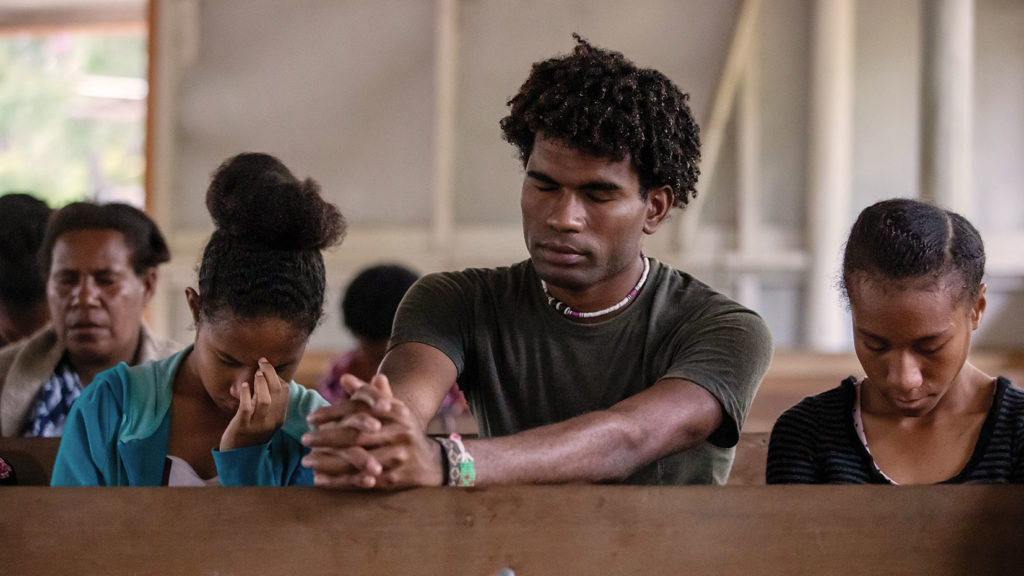
Our daily bread
For balance in our spiritual life, we dare not live only on prayer. There are other necessities too. We need to feed on the Word of God daily. It is not enough to take our fill of the Word during church worship and think we will survive the whole week without it, until the next Sabbath. Just as the children of Israel received their manna every morning—on a daily basis—so are we to pick up our daily bread every morning through the study of the Word.
Feeding on the Word is actually feeding on Jesus Christ who is the manna that came down to us from above (see John 6:32–58). Consequently, He tells us that the Scriptures “testify of Me” (John 5:39). And in teaching about prayer, He instructed His disciples to pray: “Give us this day our daily bread” (Matthew 6:11). So there is bread to pick up each day—bread for our physical lives and bread for our spiritual lives.
Imagine I have two dogs, Tiger and Spiro. I feed Tiger on a daily basis and Spiro once every week. Tell me if there would be any differences between the two dogs? Of course! Tiger, being fed every day, would be a much healthier dog. Poor Spiro, fed only once a week—well, I am sure you can imagine what his health would be like. Philip Samaan was right on target when he said, “Yesterday’s meal, no matter how ample and satisfying it was, is not sufficient for today.”
So, when to study the Word? Early morning works well for many. In a sense, we are copying the children of Israel when we open the Word in the mornings. They gathered the manna in the mornings (see Exodus 16:21). We too are on an Exodus journey and having the manna—the Bread of Life—is just as important.
With prayer, however, we must not make it only a morning or evening exercise. It must be constant and consistent—a moment-by-moment exercise. That is what it means to pray without ceasing. We do not necessarily need to close our eyes or be on bended knees in every situation. But we can pray when we are eating, walking, working, talking, listening or in any other engagements. Whatever our circumstances, we can still offer a silent prayer to God. For myself, even while preaching, I often send a quick silent prayer to God when I do not feel the power: “Please, Lord, empower the message.”
Prayer seminars or reading books about prayer are helpful and give guidance, but the best way to an active prayer life is to begin praying. Today is the day to begin.
A proud Eastern Highlands man, Zuzai Hizoke has pastored around PNG and is currently undertaking further study in Michigan, United States. This article is adapted with permission from his book on the essentials of prayer, Keeping Connection (2015, Signs Publishing Company), which can be purchased from your local Adventist Book Centre (see page 57 for locations).